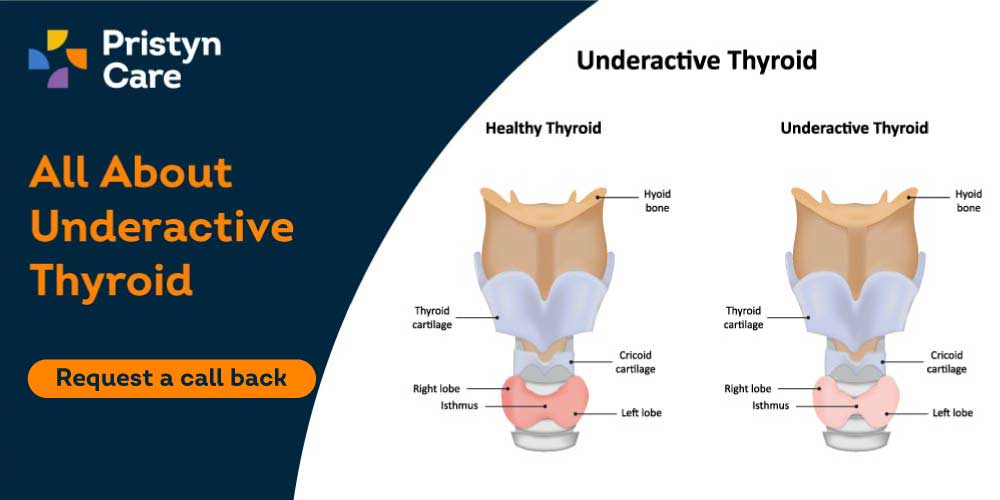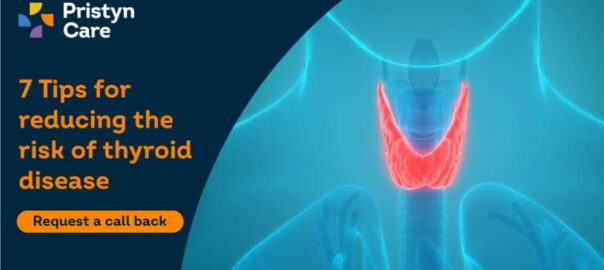![]() Views: 642
Views: 642
Underactive Thyroid (Hypothyroidism)
Dedicated Support at Every Step!
Our Doctors are available 24 hours a day, 7 days a week to help you!
Table of Contents
What is underactive thyroid?
Underactive thyroid, or hypothyroidism is a very common condition, especially among women. The thyroid gland is a butterfly-shaped organ placed in front of the neck. It forms hormones that directly affect the body’s metabolism, heartbeat, energy production, etc.
Some common symptoms of an underactive thyroid gland are:
- Fatigue
- Weight gain and high cholesterol
- Difficulty tolerating cold
- Muscle and joint pain
- Dry skin
- Thinning hair
- Slow heart rate
- Depression
These symptoms progress very slowly and as such are barely noticeable in the initial stages. This is why the condition can remain undiagnosed for months, sometimes even years. Often people think symptoms like fatigue and weight gain are a regular part of life.
No Cost EMI, Hassle-free Insurance Approval
Who can have an underactive thyroid?
Though thyroid problems can occur in men and women alike at any age, underactive thyroid generally occurs more commonly in women and people over 60 years of age. Some other conditions that can lead to underactive thyroid gland are:
- you have another thyroid issue, like a goiter
- you’re undergoing treatment for hyperthyroidism with surgery or radioactive iodine
- you’re undergoing radiation therapy, especially to the neck, thyroid or chest
- you have a family history of thyroid disease
- pregnancy
- Turner’s syndrome
- Health issues like celiac disease, Sjogren’s syndrome, pernicious anemia, diabetes, rheumatoid arthritis, lupus, etc.
There are various health problems related to it, but underactive thyroid during pregnancy is especially dangerous, as at this time, it can affect both the mother and the baby.
What are the complications of an underactive thyroid?
Low thyroid hormones contribute to cholesterol, which can result in many other overall health maladies. Some common complications of untreated underactive hypothyroidism are:
- Goiter: Continuous stimulation of the thyroid hormones can enlarge the thyroid gland- known as goiter formation. Though it isn’t uncomfortable, it affects the appearance and can eventually cause difficulty in breathing and swallowing.
- Heart problems: Thyroid hormones directly affect the heart rate and cholesterol levels, so underactive thyroid gland increases the risk of heart disease and heart failure.
- Mental health issues: Depression, anxiety and other mental health issues are very common among patients with an underactive thyroid gland.
- Peripheral neuropathy: Long-term uncontrolled low thyroid hormone levels can damage the peripheral nerves present in the arms and legs, which may ultimately result in pain, numbness, and tingling in the affected areas.
- Myxedema: Severely underactive thyroid gland can also lead to myxedema coma, an extreme form of hypothyroidism, in which the body's functions slow down so much that it can be potentially fatal. Myxedema coma should be treated immediately as soon as it occurs. It is usually triggered by sedatives, infection or other stresses on the body.
- Infertility: Low thyroid levels interfere with ovulation and impairs the body’s fertility. However, in most cases, it can be countered with proper hormone management.
- Birth defects: Women with severely underactive thyroid gland often have a higher risk of giving birth to babies with defects as compared to healthy mothers. Infants with untreated hypothyroidism also have a higher risk of physical and mental issues during developmental phase.
What are the causes behind an underactive thyroid gland?
Some common causes of hypothyroidism and underactive thyroid disorders are:
- Hashimoto’s disease
It is an autoimmune disorder and is the most common cause of hypothyroidism. In this condition, the immune system starts attacking the thyroid gland, which leads to thyroid inflammation and low thyroid hormone production.
- Thyroiditis
Thyroiditis is an inflammation of the thyroid gland which leads to leakage of the thyroid hormones. At first this leads to thyrotoxicosis, a sharp increase in the thyroid levels in the blood, but over time, the thyroid levels can become dangerously low. It can last for months, or even lead to permanently underactive thyroid. It is also very common in women who have given birth recently.
- Congenital hypothyroidism
Congenital hypothyroidism is present at birth and can lead to intellectual disability and growth failure, that's why early treatment is important for all such problems. Most newborns are tested for thyroid problems at birth to avoid these problems.
- Surgical removal of part or all of the thyroid
Thyroidectomy surgery, ie, removal of the thyroid gland is also a big contributor to hypothyroidism. Removal of the entire thyroid gland always leads to hypothyroidism. It is usually performed for issues like hyperthyroidism, large goiter, thyroid nodules and cancers.
- Radiation treatment of the thyroid
Radioactive iodine is a very common conservative treatment for hyperthyroidism and it gradually destroys thyroid cells. Eventually, the condition can result in hypothyroidism due to too much damage to the thyroid cells. Another way radiation can damage the thyroid gland is through radiotherapy for head or neck cancers.
- Certain medicines
Some medicines like heart medicines, bipolar medications, and cancer medicines can interfere with hormone production and lead to consequential hypothyroidism. If your medicines are affecting thyroid production, your doctor can prescribe you alternative medications.
- Iodine deficiency
Iodine is an important component of the thyroid hormone production process, and nutritional deficiencies like iodine deficiency can lead to low thyroid production. Underactive thyroid due to iodine deficiency is quite common in India due to imbalanced diets.
- Pituitary or hypothalamus gland disorders
Pituitary and hypothalamus glands form certain hormones and enzymes that affect the function of the thyroid hormones. Therefore, their disorders can also interfere with thyroid function and lead to hypothyroidism. This is known as secondary or tertiary hypothyroidism, as the problem lies with another gland and is causing thyroid underactivity as a secondary factor.
How is an underactive thyroid diagnosed?
To diagnose an underactive thyroid, the doctor will take a medical history and perform a physical exam. The symptoms of hypothyroidism are very similar to symptoms of various health issues, therefore the diagnosis isn’t confirmed based on both these alone. Thyroid blood tests and imaging tests are necessary to confirm the diagnosis and find the cause of the issue to treat the problem. Since it affects fertility and reproductive ability most women get tested for underactive thyroid problems when they start experiencing fertility problems.
How is an underactive thyroid managed?
The best treatment for hypothyroidism is via hormone replacement therapy. The best hormone replacement treatment for underactive thyroid gland is through levothyroxine medicine. It is generally taken in pill form early in the morning before eating.
The doctor performs a blood test every 6-8 weeks after starting the hormone replacement treatment. The dosage for medicines is adjusted based on the results of the test. Once the results level out, thyroid tests are to be conducted once every year.
However, thyroid medications have to be taken as per prescriptions, as too much thyroid hormones can lead to serious problems like atrial fibrillation or osteoporosis.
In addition to medicines, diet and nutrition are also an important part of thyroid treatment. Hashimoto’s disease and other autoimmune thyroid disorders are sensitive to iodine, and eating iodine-rich foods can worsen the problems. Therefore, properly consult your doctors before taking any medications or supplements.
Can hypothyroidism be prevented?
While hypothyroidism due to iodine and nutritional deficiencies can be prevented, autoimmune thyroid disorders can not be prevented. The best way of preventing serious effects of hypothyroidism is by getting treatment as soon as possible. If you are experiencing any symptoms of hypothyroidism, you should consult your healthcare provider and get prompt treatment.
Foods high in iodine include eggs, dairy products, meat, poultry, seaweed, seafood, iodized salt, etc. Your healthcare provider will provide you with a diet chart and dietary plan to help manage your condition. Mild cases of hypothyroidism always fade over time, however, if the patient has an underactive thyroid and low hormone levels over a long period of time, the patient may have complications for the rest of the life.








